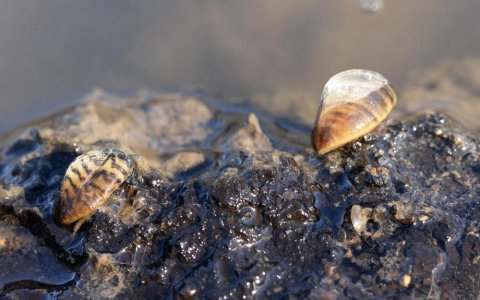- Joined
- May 29, 2015
- Posts
- 14
- Likes
- 0
- Points
- 71
Aquarium moss balls infested with zebra mussels found in Bismarck, Fargo

BLAKE NICHOLSON
North Dakota wildlife officials are asking fish aquarium owners to properly dispose of moss balls after invasive zebra mussels were found in some product sold at pet stores in Bismarck and Fargo.
Moss balls are popular with pet fish owners because they create oxygen in tanks and absorb pollutants. But infested moss balls from the Ukraine have been found in numerous states.
The U.S. Geological Survey last week found zebra mussels in “Betta Buddy” brand Marimo moss balls at a Petco in Seattle. Marimo moss is a rare form of algae from Northern Europe and Asia.
"It quickly became apparent this was not an isolated incident, but a national issue," said Ben Holen, aquatic nuisance species coordinator for the North Dakota Game and Fish Department. The moss balls are in multiple brands that have numerous U.S. distributors, he said.
Department officials confirmed zebra mussels in moss balls in Bismarck and Fargo pet stores.
"There's likely others around North Dakota, too, but those are the ones we got out to quickly," Holen said.
The department last Wednesday and Thursday contacted all pet stores in the state and had them remove moss balls from their shelves.
"We're still finding more and more brands that have issues," Holen said.
Game and Fish also is requesting sales records from stores to try to track how many of the moss balls were recently sold.
Zebra mussels compete with native species, clog water intakes and can even sink docks and buoys with their weight. Adult zebra mussels were discovered in the Red River in 2015, and they've since been confirmed in Lake LaMoure, Lake Ashtabula, the James River and the Sheyenne River, all in eastern North Dakota.
Game and Fish has been working to try to stop the westward spread of the mussels through various methods, including requiring anglers and other outdoors enthusiasts to take precautions such as cleaning aquatic vegetation from fishing equipment and watercraft.
"Any time you have a zebra mussels pathway like this that we haven't identified before, it's concerning," Holen said.
Infested moss balls put down a toilet or drain could contaminate area waters such as rivers. The proper way to dispose of them is to seal them in a bag, freeze them and put them in the trash. Alternatives to freezing are boiling or submerging in bleach or vinegar. For more information, go to https://gcc02.safelinks.protection....N27w3wzzWFObCYBMyR9sUpaNSANkHzRd8=&reserved=0https://www.fws.gov/fisheries/ANS/zebra-mussel-disposal.html.
Reach Blake Nicholson at 701-250-8266or blake.nicholson@bismarcktribune.com.

BLAKE NICHOLSON
North Dakota wildlife officials are asking fish aquarium owners to properly dispose of moss balls after invasive zebra mussels were found in some product sold at pet stores in Bismarck and Fargo.
Moss balls are popular with pet fish owners because they create oxygen in tanks and absorb pollutants. But infested moss balls from the Ukraine have been found in numerous states.
The U.S. Geological Survey last week found zebra mussels in “Betta Buddy” brand Marimo moss balls at a Petco in Seattle. Marimo moss is a rare form of algae from Northern Europe and Asia.
"It quickly became apparent this was not an isolated incident, but a national issue," said Ben Holen, aquatic nuisance species coordinator for the North Dakota Game and Fish Department. The moss balls are in multiple brands that have numerous U.S. distributors, he said.
Department officials confirmed zebra mussels in moss balls in Bismarck and Fargo pet stores.
"There's likely others around North Dakota, too, but those are the ones we got out to quickly," Holen said.
The department last Wednesday and Thursday contacted all pet stores in the state and had them remove moss balls from their shelves.
"We're still finding more and more brands that have issues," Holen said.
Game and Fish also is requesting sales records from stores to try to track how many of the moss balls were recently sold.
Zebra mussels compete with native species, clog water intakes and can even sink docks and buoys with their weight. Adult zebra mussels were discovered in the Red River in 2015, and they've since been confirmed in Lake LaMoure, Lake Ashtabula, the James River and the Sheyenne River, all in eastern North Dakota.
Game and Fish has been working to try to stop the westward spread of the mussels through various methods, including requiring anglers and other outdoors enthusiasts to take precautions such as cleaning aquatic vegetation from fishing equipment and watercraft.
"Any time you have a zebra mussels pathway like this that we haven't identified before, it's concerning," Holen said.
Infested moss balls put down a toilet or drain could contaminate area waters such as rivers. The proper way to dispose of them is to seal them in a bag, freeze them and put them in the trash. Alternatives to freezing are boiling or submerging in bleach or vinegar. For more information, go to https://gcc02.safelinks.protection....N27w3wzzWFObCYBMyR9sUpaNSANkHzRd8=&reserved=0https://www.fws.gov/fisheries/ANS/zebra-mussel-disposal.html.
Reach Blake Nicholson at 701-250-8266or blake.nicholson@bismarcktribune.com.
